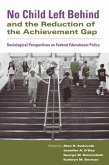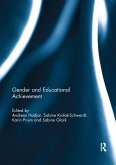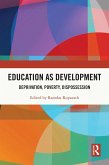No Child Left Behind and the Reduction of the Achievement Gap (eBook, ePUB)
Sociological Perspectives on Federal Educational Policy
Redaktion: Sadovnik, Alan R.; Borman, Kathryn M.; Bohrnstedt, George W.; O'Day, Jennifer A.
48,95 €
48,95 €
inkl. MwSt.
Sofort per Download lieferbar

24 °P sammeln
48,95 €
Als Download kaufen

48,95 €
inkl. MwSt.
Sofort per Download lieferbar

24 °P sammeln
Jetzt verschenken
Alle Infos zum eBook verschenken
48,95 €
inkl. MwSt.
Sofort per Download lieferbar
Alle Infos zum eBook verschenken

24 °P sammeln
No Child Left Behind and the Reduction of the Achievement Gap (eBook, ePUB)
Sociological Perspectives on Federal Educational Policy
Redaktion: Sadovnik, Alan R.; Borman, Kathryn M.; Bohrnstedt, George W.; O'Day, Jennifer A.
- Format: ePub
- Merkliste
- Auf die Merkliste
- Bewerten Bewerten
- Teilen
- Produkt teilen
- Produkterinnerung
- Produkterinnerung

Bitte loggen Sie sich zunächst in Ihr Kundenkonto ein oder registrieren Sie sich bei
bücher.de, um das eBook-Abo tolino select nutzen zu können.
Hier können Sie sich einloggen
Hier können Sie sich einloggen
Sie sind bereits eingeloggt. Klicken Sie auf 2. tolino select Abo, um fortzufahren.

Bitte loggen Sie sich zunächst in Ihr Kundenkonto ein oder registrieren Sie sich bei bücher.de, um das eBook-Abo tolino select nutzen zu können.
This collection presents the first-ever sociological analysis of the No Child Left Behind Act. More importantly, these leading sociologists consider whether NLCB can or will accomplish its major goal: to eliminate the achievement gap by 2014.
- Geräte: eReader
- mit Kopierschutz
- eBook Hilfe
- Größe: 9.49MB
Andere Kunden interessierten sich auch für
![No Child Left Behind and the Reduction of the Achievement Gap (eBook, PDF) No Child Left Behind and the Reduction of the Achievement Gap (eBook, PDF)]() No Child Left Behind and the Reduction of the Achievement Gap (eBook, PDF)48,95 €
No Child Left Behind and the Reduction of the Achievement Gap (eBook, PDF)48,95 €![The New Political Economy of Urban Education (eBook, ePUB) The New Political Economy of Urban Education (eBook, ePUB)]() Pauline LipmanThe New Political Economy of Urban Education (eBook, ePUB)47,95 €
Pauline LipmanThe New Political Economy of Urban Education (eBook, ePUB)47,95 €![Left Behind: The Public Education Crisis in the United States (eBook, ePUB) Left Behind: The Public Education Crisis in the United States (eBook, ePUB)]() Paul JalbertLeft Behind: The Public Education Crisis in the United States (eBook, ePUB)42,95 €
Paul JalbertLeft Behind: The Public Education Crisis in the United States (eBook, ePUB)42,95 €![MotherScholaring During the COVID-19 Pandemic (eBook, ePUB) MotherScholaring During the COVID-19 Pandemic (eBook, ePUB)]() MotherScholaring During the COVID-19 Pandemic (eBook, ePUB)52,95 €
MotherScholaring During the COVID-19 Pandemic (eBook, ePUB)52,95 €![Neoliberalism and the Global Restructuring of Knowledge and Education (eBook, ePUB) Neoliberalism and the Global Restructuring of Knowledge and Education (eBook, ePUB)]() Steven C. WardNeoliberalism and the Global Restructuring of Knowledge and Education (eBook, ePUB)56,95 €
Steven C. WardNeoliberalism and the Global Restructuring of Knowledge and Education (eBook, ePUB)56,95 €![Gender and Educational Achievement (eBook, ePUB) Gender and Educational Achievement (eBook, ePUB)]() Gender and Educational Achievement (eBook, ePUB)30,95 €
Gender and Educational Achievement (eBook, ePUB)30,95 €![Education as Development (eBook, ePUB) Education as Development (eBook, ePUB)]() Education as Development (eBook, ePUB)42,95 €
Education as Development (eBook, ePUB)42,95 €-
-
-
This collection presents the first-ever sociological analysis of the No Child Left Behind Act. More importantly, these leading sociologists consider whether NLCB can or will accomplish its major goal: to eliminate the achievement gap by 2014.
Dieser Download kann aus rechtlichen Gründen nur mit Rechnungsadresse in A, B, BG, CY, CZ, D, DK, EW, E, FIN, F, GR, HR, H, IRL, I, LT, L, LR, M, NL, PL, P, R, S, SLO, SK ausgeliefert werden.
Produktdetails
- Produktdetails
- Verlag: Taylor & Francis eBooks
- Seitenzahl: 424
- Erscheinungstermin: 11. Oktober 2013
- Englisch
- ISBN-13: 9781135916879
- Artikelnr.: 39703720
- Verlag: Taylor & Francis eBooks
- Seitenzahl: 424
- Erscheinungstermin: 11. Oktober 2013
- Englisch
- ISBN-13: 9781135916879
- Artikelnr.: 39703720
- Herstellerkennzeichnung Die Herstellerinformationen sind derzeit nicht verfügbar.
Alan R. Sadovnik is Professor of Education, Sociology, and Public Affairs at Rutgers University. Jennifer A. O'Day is Managing Research Scientist and Policy Analyst in the Education Program at the American Institute for Research. George W. Bohrnstedt is Senior Vice President for Research at the American Institute for Research. Kathryn M. Borman is Professor of Anthropology at University of South Florida.
Introduction George Bohrnstedt and Jennifer O' Day Part 1: Federal and
State Educational Policy and NCLB 1. No Child Left Behind? Sociology
Ignored! David Karen Part 2: Accountability and Assessment 2. NCLB and the
Complexity of School Improvement Jennifer O'Day 3. Double Standards for
Graduation Rate Accountability? Or None? Christopher B. Swanson 4. Who
Counts for Accountability?: High-Stakes Test Exemptions in a Large Urban
School District Jennifer Booher-Jennings and Andrew Beveridge 5. Inside the
Black Box of Accountability: How High-Stakes Accountability Alters School
Culture and the Classification and Treatment of Students and Teachers
Katie Weitz White and James Rosenbaum Part 3: Teaching and Teacher Quality
6. AIR, State Policy Activity under NCLB: Adequate Yearly Progress and
Highly Qualified Teachers Kerstin Carlson Le Floch 7. Professionalism Under
Siege: Teachers' Views of the No Child Left Behind Act Steven Brint and Sue
Teele 8. Teacher Quality: Educational Inequality and the Organization of
Schools Richard Ingersoll 9. Teaching Quality as a Problem of School Change
Joan Talbert and Milbrey McLaughlin Part 4: School Choice and Parental
Involvement 10. False Promises: The School Choice Provisions in No Child
Left Behind Douglas Lee Lauen 11. When School Choice Leaves Many Children
Behind: Implications for NCLB from the Charlotte-Mecklenburg Schools
Roslyn Arlin Mickelson and Stephanie Southworth 12. Non-Promotional School
Change and the Achievement of Texas Students: Possible Public School Choice
Outcomes under No Child Left Behind A. Gary Dworkin and Jon Lorence 13.
Research Meets Policy and Practice: How Are School Districts Addressing
NCLB Requirements for Parental Involvement? Joyce L. Epstein 14. Getting
Families Involved With NCLB: Factors Affecting Schools' Enactment of
Federal Policy Steven B. Sheldon Part 5: Federal Involvement, NCLB and the
Reduction of the Achievement Gap 15. Learning from Philadelphia's School
Reform: The Impact of NCLB and Related State Legislation Elizabeth Useem
16. Can NCLB Close Achievement Gaps? David Armor 17. Symbolic Uses of the
"No Child Left Behind Act": Reaffirmation of Equality of Educational
Opportunity or De-Legitimization of Public Schools? Mary Haywood Metz 18.
Conclusion: Sociological Perspectives on NCLB and Federal Involvement in
Education Alan R. Sadovnik, A.Gary Dworkin, Adam Gamoran, Maureen Hallinan
and Janelle Scott
State Educational Policy and NCLB 1. No Child Left Behind? Sociology
Ignored! David Karen Part 2: Accountability and Assessment 2. NCLB and the
Complexity of School Improvement Jennifer O'Day 3. Double Standards for
Graduation Rate Accountability? Or None? Christopher B. Swanson 4. Who
Counts for Accountability?: High-Stakes Test Exemptions in a Large Urban
School District Jennifer Booher-Jennings and Andrew Beveridge 5. Inside the
Black Box of Accountability: How High-Stakes Accountability Alters School
Culture and the Classification and Treatment of Students and Teachers
Katie Weitz White and James Rosenbaum Part 3: Teaching and Teacher Quality
6. AIR, State Policy Activity under NCLB: Adequate Yearly Progress and
Highly Qualified Teachers Kerstin Carlson Le Floch 7. Professionalism Under
Siege: Teachers' Views of the No Child Left Behind Act Steven Brint and Sue
Teele 8. Teacher Quality: Educational Inequality and the Organization of
Schools Richard Ingersoll 9. Teaching Quality as a Problem of School Change
Joan Talbert and Milbrey McLaughlin Part 4: School Choice and Parental
Involvement 10. False Promises: The School Choice Provisions in No Child
Left Behind Douglas Lee Lauen 11. When School Choice Leaves Many Children
Behind: Implications for NCLB from the Charlotte-Mecklenburg Schools
Roslyn Arlin Mickelson and Stephanie Southworth 12. Non-Promotional School
Change and the Achievement of Texas Students: Possible Public School Choice
Outcomes under No Child Left Behind A. Gary Dworkin and Jon Lorence 13.
Research Meets Policy and Practice: How Are School Districts Addressing
NCLB Requirements for Parental Involvement? Joyce L. Epstein 14. Getting
Families Involved With NCLB: Factors Affecting Schools' Enactment of
Federal Policy Steven B. Sheldon Part 5: Federal Involvement, NCLB and the
Reduction of the Achievement Gap 15. Learning from Philadelphia's School
Reform: The Impact of NCLB and Related State Legislation Elizabeth Useem
16. Can NCLB Close Achievement Gaps? David Armor 17. Symbolic Uses of the
"No Child Left Behind Act": Reaffirmation of Equality of Educational
Opportunity or De-Legitimization of Public Schools? Mary Haywood Metz 18.
Conclusion: Sociological Perspectives on NCLB and Federal Involvement in
Education Alan R. Sadovnik, A.Gary Dworkin, Adam Gamoran, Maureen Hallinan
and Janelle Scott
Introduction George Bohrnstedt and Jennifer O' Day Part 1: Federal and
State Educational Policy and NCLB 1. No Child Left Behind? Sociology
Ignored! David Karen Part 2: Accountability and Assessment 2. NCLB and the
Complexity of School Improvement Jennifer O'Day 3. Double Standards for
Graduation Rate Accountability? Or None? Christopher B. Swanson 4. Who
Counts for Accountability?: High-Stakes Test Exemptions in a Large Urban
School District Jennifer Booher-Jennings and Andrew Beveridge 5. Inside the
Black Box of Accountability: How High-Stakes Accountability Alters School
Culture and the Classification and Treatment of Students and Teachers
Katie Weitz White and James Rosenbaum Part 3: Teaching and Teacher Quality
6. AIR, State Policy Activity under NCLB: Adequate Yearly Progress and
Highly Qualified Teachers Kerstin Carlson Le Floch 7. Professionalism Under
Siege: Teachers' Views of the No Child Left Behind Act Steven Brint and Sue
Teele 8. Teacher Quality: Educational Inequality and the Organization of
Schools Richard Ingersoll 9. Teaching Quality as a Problem of School Change
Joan Talbert and Milbrey McLaughlin Part 4: School Choice and Parental
Involvement 10. False Promises: The School Choice Provisions in No Child
Left Behind Douglas Lee Lauen 11. When School Choice Leaves Many Children
Behind: Implications for NCLB from the Charlotte-Mecklenburg Schools
Roslyn Arlin Mickelson and Stephanie Southworth 12. Non-Promotional School
Change and the Achievement of Texas Students: Possible Public School Choice
Outcomes under No Child Left Behind A. Gary Dworkin and Jon Lorence 13.
Research Meets Policy and Practice: How Are School Districts Addressing
NCLB Requirements for Parental Involvement? Joyce L. Epstein 14. Getting
Families Involved With NCLB: Factors Affecting Schools' Enactment of
Federal Policy Steven B. Sheldon Part 5: Federal Involvement, NCLB and the
Reduction of the Achievement Gap 15. Learning from Philadelphia's School
Reform: The Impact of NCLB and Related State Legislation Elizabeth Useem
16. Can NCLB Close Achievement Gaps? David Armor 17. Symbolic Uses of the
"No Child Left Behind Act": Reaffirmation of Equality of Educational
Opportunity or De-Legitimization of Public Schools? Mary Haywood Metz 18.
Conclusion: Sociological Perspectives on NCLB and Federal Involvement in
Education Alan R. Sadovnik, A.Gary Dworkin, Adam Gamoran, Maureen Hallinan
and Janelle Scott
State Educational Policy and NCLB 1. No Child Left Behind? Sociology
Ignored! David Karen Part 2: Accountability and Assessment 2. NCLB and the
Complexity of School Improvement Jennifer O'Day 3. Double Standards for
Graduation Rate Accountability? Or None? Christopher B. Swanson 4. Who
Counts for Accountability?: High-Stakes Test Exemptions in a Large Urban
School District Jennifer Booher-Jennings and Andrew Beveridge 5. Inside the
Black Box of Accountability: How High-Stakes Accountability Alters School
Culture and the Classification and Treatment of Students and Teachers
Katie Weitz White and James Rosenbaum Part 3: Teaching and Teacher Quality
6. AIR, State Policy Activity under NCLB: Adequate Yearly Progress and
Highly Qualified Teachers Kerstin Carlson Le Floch 7. Professionalism Under
Siege: Teachers' Views of the No Child Left Behind Act Steven Brint and Sue
Teele 8. Teacher Quality: Educational Inequality and the Organization of
Schools Richard Ingersoll 9. Teaching Quality as a Problem of School Change
Joan Talbert and Milbrey McLaughlin Part 4: School Choice and Parental
Involvement 10. False Promises: The School Choice Provisions in No Child
Left Behind Douglas Lee Lauen 11. When School Choice Leaves Many Children
Behind: Implications for NCLB from the Charlotte-Mecklenburg Schools
Roslyn Arlin Mickelson and Stephanie Southworth 12. Non-Promotional School
Change and the Achievement of Texas Students: Possible Public School Choice
Outcomes under No Child Left Behind A. Gary Dworkin and Jon Lorence 13.
Research Meets Policy and Practice: How Are School Districts Addressing
NCLB Requirements for Parental Involvement? Joyce L. Epstein 14. Getting
Families Involved With NCLB: Factors Affecting Schools' Enactment of
Federal Policy Steven B. Sheldon Part 5: Federal Involvement, NCLB and the
Reduction of the Achievement Gap 15. Learning from Philadelphia's School
Reform: The Impact of NCLB and Related State Legislation Elizabeth Useem
16. Can NCLB Close Achievement Gaps? David Armor 17. Symbolic Uses of the
"No Child Left Behind Act": Reaffirmation of Equality of Educational
Opportunity or De-Legitimization of Public Schools? Mary Haywood Metz 18.
Conclusion: Sociological Perspectives on NCLB and Federal Involvement in
Education Alan R. Sadovnik, A.Gary Dworkin, Adam Gamoran, Maureen Hallinan
and Janelle Scott







